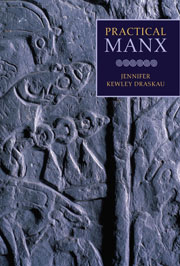Book contents
- Frontmatter
- Contents
- Preface and acknowledgements
- Abbreviations
- 1 Initial sound change
- 2 Nouns
- 3 Pronouns
- 4 Prepositions
- 5 The article
- 6 Adjectives and adverbs
- 7 Conjunctions
- 8 Numerals
- 9 Verbs
- 10 Phrasal verbs
- 11 The verb in use
- 12 Word order and sentence structure; word building
- 13 Dates and seasons
- 14 Emphasis
- 15 Spelling and pronunciation
- Gist English translations of recorded Manx conversations
- Glossary
- Select bibliography
Preface and acknowledgements
- Frontmatter
- Contents
- Preface and acknowledgements
- Abbreviations
- 1 Initial sound change
- 2 Nouns
- 3 Pronouns
- 4 Prepositions
- 5 The article
- 6 Adjectives and adverbs
- 7 Conjunctions
- 8 Numerals
- 9 Verbs
- 10 Phrasal verbs
- 11 The verb in use
- 12 Word order and sentence structure; word building
- 13 Dates and seasons
- 14 Emphasis
- 15 Spelling and pronunciation
- Gist English translations of recorded Manx conversations
- Glossary
- Select bibliography
Summary
Manx, like Scottish Gaelic and Irish, is a Goidelic language. Other authorities have provided overviews of the Celtic languages, detailed accounts of their phonology, bilingual dictionaries, histories of Manx, creative writing in Manx, course-books and primers. This is not the place for any of that. Interested readers are advised to consult Cregeen, Goodwin, Kelly, Kneen, Pilgrim, Stowell, Thomson, and other authorities featured in the bibliography.
For various reasons, its present spelling system differs radically from traditional Goidelic spelling, but in other respects Manx displays many similarities with related languages and is to some degree intelligible to speakers of Irish and Scots Gaelic, once they have recovered from the initial shock of its orthography. The system itself is riddled with exceptions and some inconsistencies. Hyphenation is variable in Manx as in most languages. The hyphens and apostrophes used throughout this book represent one option, perhaps the most current at time of writing, but it is not the intention to present a prescriptive system.
It will be noted that the examples in this book are taken from as broad a spectrum as possible, from both spoken and written modes, and from the various chronological stages of Manx: from the earliest known texts and from Classical written Manx to twenty-first-century writers and poets, from the recorded speech of the so-called ‘Late Manx’ native speakers to that of today's fluent speakers. Initials after the examples refer to four speakers recorded in spontaneous Manx conversation while this book was being written.
- Type
- Chapter
- Information
- Practical Manx , pp. xix - xxiiPublisher: Liverpool University PressPrint publication year: 2008



